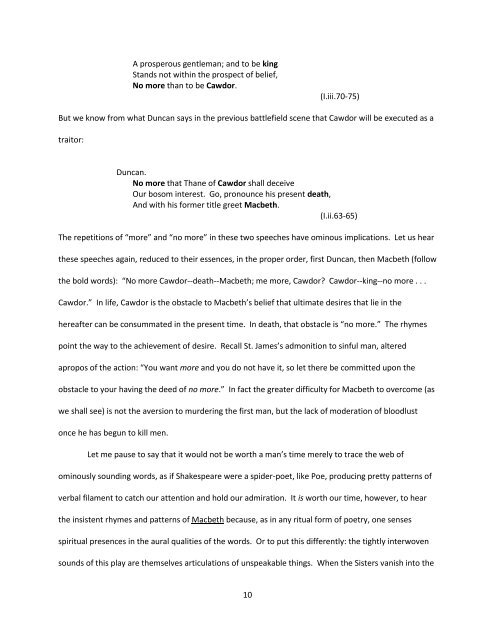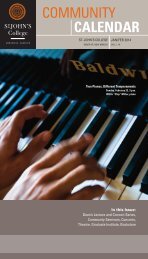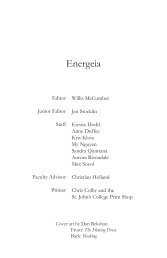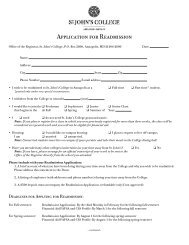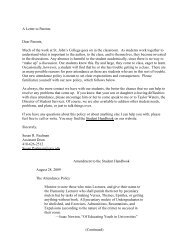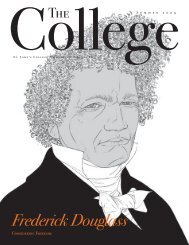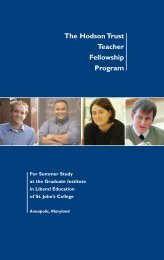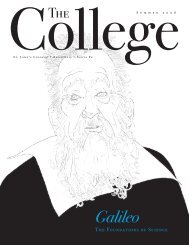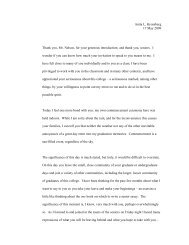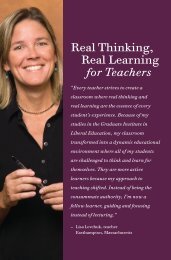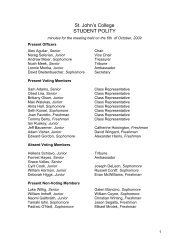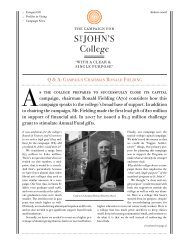âTo Meet with Macbeth,â given by tutor Louis ... - St. John's College
âTo Meet with Macbeth,â given by tutor Louis ... - St. John's College
âTo Meet with Macbeth,â given by tutor Louis ... - St. John's College
Create successful ePaper yourself
Turn your PDF publications into a flip-book with our unique Google optimized e-Paper software.
A prosperous gentleman; and to be king<br />
<strong>St</strong>ands not <strong>with</strong>in the prospect of belief,<br />
No more than to be Cawdor.<br />
(I.iii.70-75)<br />
But we know from what Duncan says in the previous battlefield scene that Cawdor will be executed as a<br />
traitor:<br />
Duncan.<br />
No more that Thane of Cawdor shall deceive<br />
Our bosom interest. Go, pronounce his present death,<br />
And <strong>with</strong> his former title greet <strong>Macbeth</strong>.<br />
(I.ii.63-65)<br />
The repetitions of “more” and “no more” in these two speeches have ominous implications. Let us hear<br />
these speeches again, reduced to their essences, in the proper order, first Duncan, then <strong>Macbeth</strong> (follow<br />
the bold words): “No more Cawdor--death--<strong>Macbeth</strong>; me more, Cawdor? Cawdor--king--no more . . .<br />
Cawdor.” In life, Cawdor is the obstacle to <strong>Macbeth</strong>’s belief that ultimate desires that lie in the<br />
hereafter can be consummated in the present time. In death, that obstacle is “no more.” The rhymes<br />
point the way to the achievement of desire. Recall <strong>St</strong>. James’s admonition to sinful man, altered<br />
apropos of the action: “You want more and you do not have it, so let there be committed upon the<br />
obstacle to your having the deed of no more.” In fact the greater difficulty for <strong>Macbeth</strong> to overcome (as<br />
we shall see) is not the aversion to murdering the first man, but the lack of moderation of bloodlust<br />
once he has begun to kill men.<br />
Let me pause to say that it would not be worth a man’s time merely to trace the web of<br />
ominously sounding words, as if Shakespeare were a spider-poet, like Poe, producing pretty patterns of<br />
verbal filament to catch our attention and hold our admiration. It is worth our time, however, to hear<br />
the insistent rhymes and patterns of <strong>Macbeth</strong> because, as in any ritual form of poetry, one senses<br />
spiritual presences in the aural qualities of the words. Or to put this differently: the tightly interwoven<br />
sounds of this play are themselves articulations of unspeakable things. When the Sisters vanish into the<br />
10


